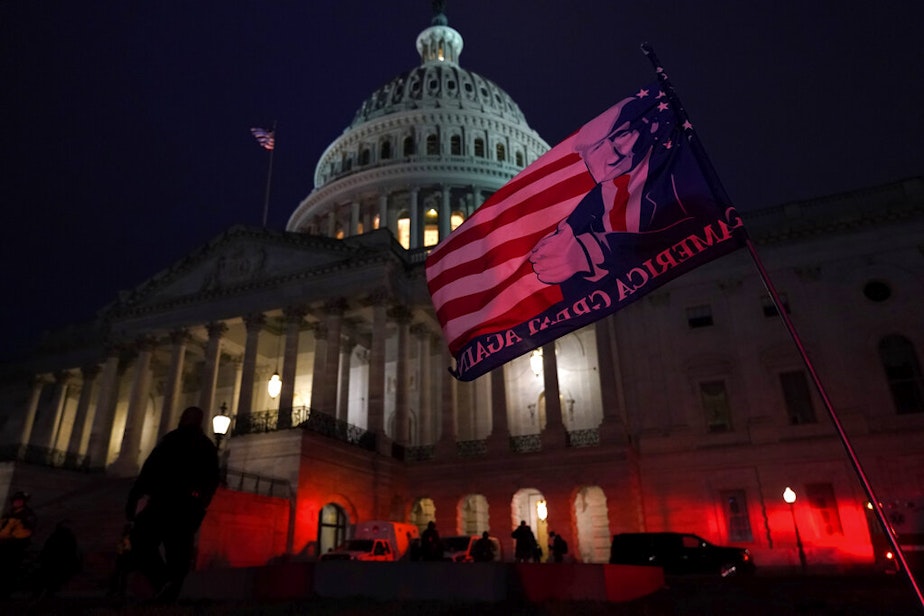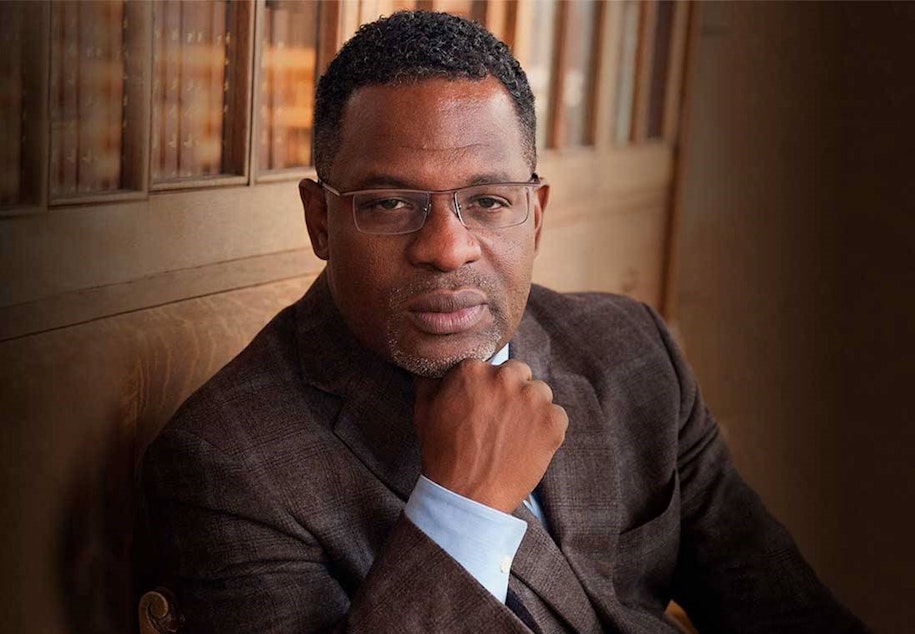New UW study examines Trump followers' MAGA beliefs

A nationwide study is delving deep into the beliefs and attitudes of self-described Trump supporters.
Christopher Sebastian Parker is a professor of political science at the University of Washington. He and his team surveyed hundreds of people in the Make America Great Again movement, both before and after the January 6 insurrection at the U.S. Capitol.
Among respondents to the study, 98% said they believe Trump's claims of election fraud, and distrust the 2020 presidential election results.
T
hat represented just how much they were fervent, true believers in Trump. They just refused to acknowledge reality. These people see Trump as the last thing between them — that is to say “real Americans” — and the rest of us: People who are progressive, people of color, feminists, and migrants from elsewhere.
They see Trump as a vessel; as a means to stand between us and them. That's why he's able to get away with so much. Clearly, he's able to get away with a whole lot. People think these people are crazy; they are not crazy.
They are just trying to maintain their social prestige or social position in American society. So they just refuse to believe reality when it comes to Trump because they need him — he's their savior.
When we examined who bore responsibility for the riots. 95% of [participants] that said that it was ANTIFA. Only 2% said it was Trump. That's not wholly unexpected that they would say that, but the difference in the margins just blew me away.
The other thing that I found jarring, but not totally unexpected, was the extent to which they believed in conspiratorial discourse. We asked them questions like whether or not people in secret places are really making all the decisions in the United States, and whether or not freedom for “real Americans” is running out so fast that we have to do everything to maintain it. There were healthy margins that agreed with both of those.

What we wanted to do was test this hypothesis: That these people are just really into conspiratorial thinking because of this political paranoia that they have. The political paranoia is associated with American society changing too fast. You have more immigrants coming here. You have an increasing number of women who are in positions of power — in politics, the private sector, and in business.
What started this whole thing and essentially got Trump elected is that we had a Black president — it scared them so much. It's like, "Oh, things are just really off course, so we need to right this course."
I knew Trump was going to win if he mobilized the Tea Party base that was so anti-Obama. I knew, it was going to be a done deal — and it was.
People keep saying the Republican Party is either in the midst of a civil war or is en route to one. I think that's largely true, but this wouldn't be the first time it has happened. We can go back roughly 50 to 60 years and see similar patterns playing out.
You had the establishment wing of the party, which was led by William F. Buckley, coming out of the 1950s into the early 1960s. Then you had another wing of the party that was mainly led by the John Birch Society, which was pretty reactionary. They came out against the civil rights movement. Which is not to say that Buckley embraced the civil rights movement because he did not.
But these people that were part of the John Birch Society wanted to rid the Supreme Court of Earl Warren, because of the decision in Brown v. Board of Education. They also thought that President Eisenhower was in cahoots with the “communists,” because we didn't bomb North Korea to smithereens, back to the Stone Age. So they wanted to get rid of President Eisenhower as well. That's kind of just how conspiratorial these people were.
You had a real split back then between this more establishment wing of the party and the more reactionary wing of the party. That’s exactly what's going on right now. We see an establishment wing of the party that's ostensibly led by Minority Leader Mitch McConnell, and then you have this reactionary wing of the party that's led by the former President Trump.
Trump has the upper hand right now because the reactionary wing of the Republican Party constitutes 50% of the GOP. Then you have another roughly 40% who were just wedded to the party and the policies, not necessarily Trump and all of his rhetoric. Then you have another 10% that are the Never Trump and Lincoln Project Republicans, the ones that just really hate Trump.
I would say right now that the reactionary wing of the party has the advantage. Because these politicians are terminally ambitious, they are loath to cross Trump, because they know that if they cross Trump, even though he doesn’t have Twitter, then they get primaried.
Trump has an iron grip on the party right now. He will likely have it into the near future because he can run for the Oval Office once again. And even if he didn’t run again, he's still the kingmaker.
I wanted the public to get beyond the rhetoric that we so often see on cable news, and I don't care what channel you're looking at — Fox, CNN, MSNBC — a lot of the conclusions at which they arrive are based strictly on conjecture. That just drives me crazy.
To avoid that, we wanted to disseminate our preliminary findings as soon as possible, just so the educated public can have an idea of who these people are, using hard evidence, and how they think, using hard evidence, and what they said, using hard evidence, and just how out of step they are with the rest of American society. We wanted to put facts, hard numbers, and empirical evidence before the public, so they can make a decision based on that.
Listen to the interview by clicking the play button above.





